
TU/e student and part-time soldier
Physics student Tim Hulsen tells us about his special side job in the National Reserve Corps
The National Reserve Corps (Natres) is a unit of reservists – aka part-time soldiers – who work for the Dutch Ministry of Defense alongside their regular job or studies. They are called upon for specific tasks such as guarding objects, disaster relief, and military exercises. One of them is Tim Hulsen, fifth-year student of Applied Physics. For him, working at Natres is the ideal side job. “You step out of the academic bubble and learn to cooperate on an entirely different level.”
Tim Hulsen (in the main photo left) has always been interested in the military and even toyed with the idea of becoming a professional soldier. But his passion for technology made it a tricky choice. In the end, he chose to study Physics at TU/e, putting his military dream aside. That quickly changed when he saw a call for part-time soldiers. “This combination is perfect for me,” he says happily. Five years later, Hulsen is still active in Natres. And he is not the only one: several TU/e students combine their studies with this special side job.
From swine fever to floods
“Our main task is to guard and secure crucial objects in the Netherlands, such as military locations, power stations, and transports,” Hulsen explains. “But in practice our activities are very broad and varied.” In addition to security, the reservists also perform ceremonial tasks, for instance on Budget Day and at national commemorations and events such as the International Four Day Marches Nijmegen. They also support the professional soldiers during various exercises and can be deployed in all kinds of crisis situations.
“What I am most proud of,” Hulsen continues, “is our contribution to disaster relief.” For example, his unit helped combat swine fever in North Brabant and the floods in Limburg, where he himself was deployed. But more about that later.
Push-ups, sit-ups, and running
In order to work for the Ministry of Defense, you have to pass a fitness test as well as various medical and psychological examinations. But according to Hulsen, it’s all quite doable. “Reservists are in cluster one of six, which is the lightest cluster,” he explains. “If you have a reasonable basic fitness, you shouldn’t have any problems.” For men, the test consists of 20 push-ups, 30 sit-ups, and running 2400 meters within 12 minutes.
If you pass all the tests successfully and are accepted, you start with initial training of two weeks, in which you’re introduced to all aspects of working as a soldier and learn various skills. An important part of this is basic marksmanship training. “Of all the basic skills, that one takes the most time,” says Hulsen. After this, you’re assigned to a unit for further training and development. “I am with Charlie Company in Oirschot,” he says. “This is actually around the corner from the campus.”
In your own unit, you spend an average of two evenings and one Saturday per month receiving all kinds of follow-up training in which you master more and more skills, from first aid to shooting and radio procedures. As a reservist, you never stop learning, says Hulsen. “You keep training constantly to keep all of your skills up to date and be ready when you need to,” he explains.
Solidarity and teamwork
What he really likes about working for Defense is the enormous sense of solidarity within the group. “You really function as one team and are dependent on each other. You tackle all challenges together.” And not only with people in your own team, he adds. You often have to stand side by side with people from other units that you don’t know that well, which also results in good teamwork. “One of the things you learn as a reservist is how important cooperation is.”
He also appreciates the stark contrast with the academic environment. “At university, you often concern yourself with theory, which generally means there’s lots of discussion and little action. It’s nice to balance this out with something where you can be physically active and achieve things together with the mindset: ‘We can do this, leave it to us!’”
A diverse group
As a reservist, you’re also in a very diverse group of people with different backgrounds, ages, and education levels. This diversity takes you out of your bubble and teaches you to work better with others, Hulsen believes.
In recent years, more and more women joined. “When I started five years ago, there were almost no women; now about ten percent of the reservists are women,” he says. “And they’re at least as capable as the men.”
Surprised reactions
When Hulsen tells them about his side job, a lot of people react with surprise. “Many people do not know that it’s possible to work a part-time job at Defense,” he says. But that surprise often quickly turns into positive reactions, for example during the Intro Week, where reservists tried to recruit new members. “Many students left their details for more information.”
Direct impact
Looking back at five years at Defense, what has stuck with Hulsen the most? “It was very special to be able to help with the floods in Limburg,” he says without hesitation. “We filled sandbags all night long; some of us were literally standing in the water. In the background, you could see the houses the water was flowing toward. The mayor even came by personally to bring food as a thank you. It was great to be able to make such a direct impact.”
Regular information meetings are organized. If you’re interested, go to Werken bij Defensie.


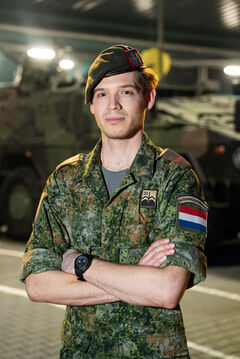
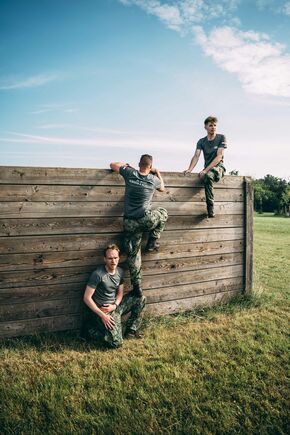
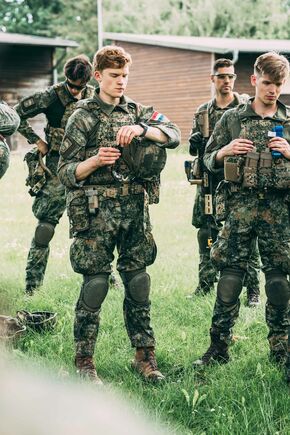
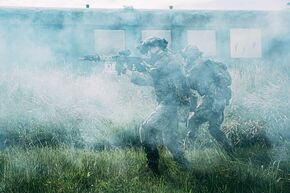
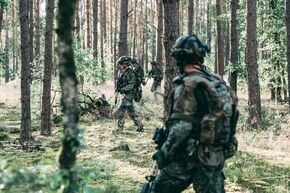
Discussion